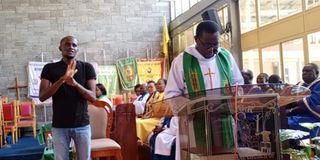How being raised by Deaf parents inspired my sign language interpreter career

Ezekiel Kamau(in black ) interpreting the sermon at ACK Cathedral church on September 15, 2024.
The feeling of being understood is deeply comforting, especially in a world where it's easy to feel misunderstood.
25-year-old Ezekiel Kamau understands this better than most people.
Growing up with Deaf parents, Kamau witnessed first-hand how difficult it was for his parents to express themselves to people who did not understand sign language.
As the eldest child, he had to learn sign language to communicate with his parents.
His first exposure to signing came from his maternal grandmother, who taught him basic signs when he stayed with her.
"When I was in primary school, around class three or four, my classmates would ask why my mom didn’t speak. I was confused because I assumed everyone communicated with their parents the same way I did. I asked my grandmother about it and she explained that mom and dad could not hear sounds like I did," he recalls.
His grandmother then began teaching him how to speak, as he was often the one sent on errands by his parents.
Later, while in seventh grade, Kamau discovered a sign language alphabet chart among his father's documents, sparking a deep interest in sign language.
His father began teaching him more advanced sign language, often involving Kamau in interactions with his Deaf colleagues to help him practise.
"My dad played a key role in helping me develop my skills, especially during my high school years when I spent a lot of time with him," Kamau shares.
He would accompany his parents and still go with his mom to her check-ups, church, and other events. Over time, this created such a strong bond that she doesn't accept any other interpreter besides him.
In 2019, Kamau landed his first job as an interpreter, realising that his skill could be turned into a profession.
"My dad wanted me to join the National Youth Service, but I knew sign language interpretation was my path. However, I missed an opportunity because the company required certification," he explains.
Determined not to let this setback stop him, Kamau enrolled in a Kenya Sign Language certification course, ensuring he would be prepared for future opportunities, which he would later complement with a diploma in Information Technology (IT).
Today, Kamau is a certified interpreter and part-time Kenya Sign Language trainer at Horizon Sign Language Institute, balancing these roles with other side ventures.
"Interpreting and training are my main sources of income, and they've allowed me to support my family," he says.
Kamau charges Sh. 2,000 per hour for interpretation services, Sh. 1,000 per training session in class and individual training and serves as the vice secretary of the Children of Deaf Adults in Kenya (CODA-K).
His wish, he says, is for every sub-county in Nakuru to have at least two interpreters to help bridge communication gaps and promote inclusivity in public services.
"I’m also advocating for the development of information management systems that can convert sign language to speech or text and vice versa, to improve service delivery for the Deaf community in the county," Kamau adds.


